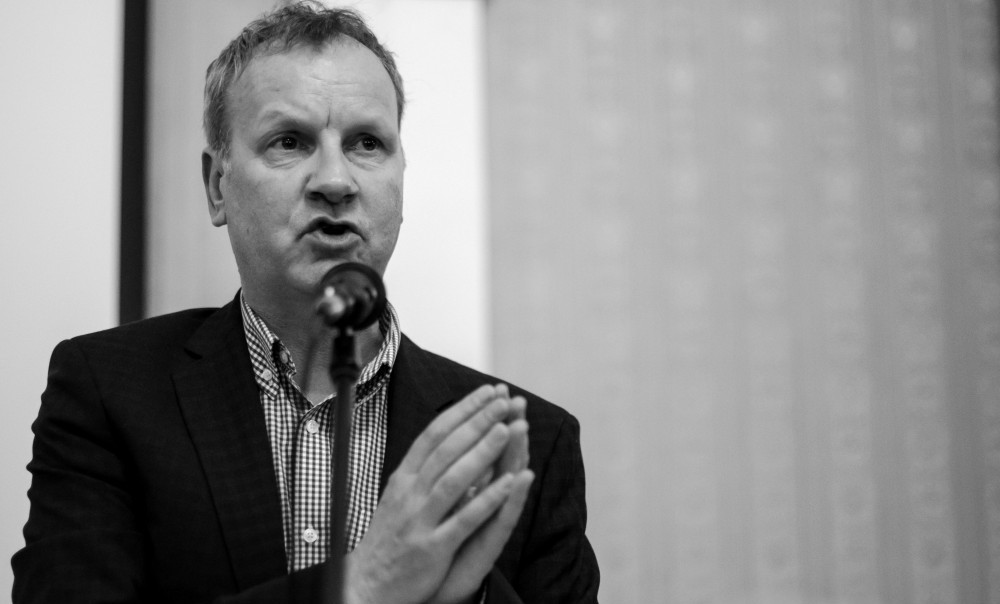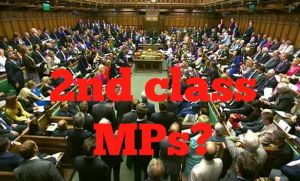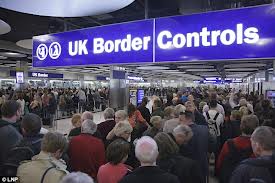Pete Wishart (Perth and North Perthshire) (SNP): After an hour and 40 minutes, and six speeches, we are actually getting to hear from the Members of Parliament who this is being done to—the Scottish Members of Parliament. This will, I hope, be the last instalment of what can only be called the sorry saga of English votes for English laws. Never has such massive and significant constitutional change been undertaken on the basis of plans that are so meagre, so threadbare, so inept, and so stupid.
I have searched the documents for all the statements that have been made about these plans and all the various words that have been used in these debates. I came up with a word cloud, because I hear they are quite popular just now, to see the favourite words used—namely, “shambles”, “disaster”, “mess”, “dog’s breakfast”, “unnecessary”, “won’t work”. There are some really good Scottish words that sum this up perfectly, with apologies to my friends in Hansard: “boorach”, “guddle”. Even those words do not do justice to the mess that has been created by these plans.

In the course of the past couple of months since the Leader of the House’s plans were first introduced, he has managed to convince absolutely nobody about their quality. Not one political party in this House supports these plans other than the Conservatives. Not one devolved legislature, Assembly or Parliament throughout the United Kingdom supports these plans; in fact, they are resolutely opposed. Even the donors and the cronies down the corridor do not support these plans. Even the Procedure Committee, with a Conservative Chair and a Conservative majority, finds massive difficulties with what is proposed. An exercise in building consensus and working in partnership this most definitely is not. To proceed with such historic constitutional change without even a shred of consensus is probably about the worst way possible to embark on such plans.
We will, of course, oppose the plans in full. We have not tabled any amendments because we do not want to dignify the proposals with any suggestion that they should be approved. We will vote them down altogether. We will support some of the Labour amendments, which are marginally better than what is on offer, but we will do so half-heartedly, because we object to the basic principle.
The Leader of the House tries to convince us—he did it again in his speech today—that these are tiny, eensy-weensy little tinkerings with the constitution of the House. “What are all you Scots getting upset about?”, he wails at us. “What are you bothered about? It’s only a little veto you’re going to be exposed to.” Well, let me tell him: how dare you give us second-class status in this place. How dare you disrespect the views of the Scottish electorate and diminish the role of Scottish Members of Parliament.
Mr Rees-Mogg: It is most important that the proposal does not create a second-class tier of Members of Parliament. Given that it comes under Standing Orders, in the event of there being a Government who are dependent on Scottish votes for their majority, they could repeal the Standing Order. Therefore the basis of the authority of each MP remains identical.
Pete Wishart: I have a lot of respect for the hon. Gentleman’s views, but he is quite simply wrong. The basic principle of the plans is that I and my hon. Friends will be second-class citizens in the unitary Parliament of the United Kingdom of Great Britain and Northern Ireland. That is unacceptable.
Scotland is watching this debate and the mood is darkening. If this is an exercise in saving the Union, the Government could not have contrived a more inept way to do so. Support for independence is increasing. The Conservatives got 14% of the vote in Scotland at the general election. It was an historic low. They have not secured such a vote since the 19th century. Once this has been done to Scottish Members of Parliament—our elected representatives—just watch their polls continue to plummet.
Rebecca Pow (Taunton Deane) (Con): The proposal was a clear manifesto pledge by our party and we were voted in by the people. Does not the hon. Gentleman agree that it is the people who want this to happen?
Pete Wishart: I do not think that English Conservative Members quite get it. The United Kingdom is supposed to be a partnership of equals. There are issues and difficulties—fair enough—and I know they are upset about what is going on with English votes for English laws, but we are a nation. Does the hon. Lady know how many Conservative Members there are in Scotland? One, and he barely scraped in. Our view is legitimate and we reject being made second-class citizens in this Parliament. This is our Parliament as much as the hon. Lady’s. This is the unitary Parliament of Great Britain and Northern Ireland, and yet we have to accept second-class status. No wonder the mood is darkening in Scotland.
Mr Hanson: Andrew Bonar Law, Campbell-Bannerman, Asquith, Lloyd George, Gordon Brown, James Callaghan, Gladstone, Winston Churchill and a range of others had constituencies in Scotland or Wales and served as Prime Minister of the United Kingdom. Does the hon. Gentleman envisage a Scot or a Welsh MP ever again being Prime Minister?
Pete Wishart: I say candidly that I do not envisage that happening again. It would be absurd for a Scottish Member of Parliament to be a Secretary of State for Health or Education, because they would be debarred from full voting entitlements on getting legislation through the House. I do not foresee there ever again being a Scottish, Welsh or possibly Northern Irish Minister in one of the great devolved Departments of state. I do not think there will be another Scottish Prime Minister. I am sorry to upset some of my hon. Friends, but I cannot think of any circumstance where that would be possible. This is the beginning of the process of creating two classes of Members of Parliament in this House and it will be instinctively followed by a hardening of those positions.
Robert Jenrick (Newark) (Con): Will the hon. Gentleman give way?
Pete Wishart: I want to make some progress, because I am conscious that a lot of my hon. Friends want to speak.
This is the fourth time these hastily redrawn plans have been presented to the House, which says absolutely everything we need to know about them. [Interruption.] Does the hon. Member for Nottingham North (Mr Allen) want to intervene? He is chuntering away.
Mr Graham Allen: I will gladly intervene, but very quickly, in view of what I said earlier. The hon. Gentleman is posing as a second-class Member of Parliament, but he is getting a first-class allocation of unlimited time. Perhaps he would care to give those of us who are second class a go as well.
Pete Wishart: May I say ever so gently to the hon. Gentleman that this is being done to us and it has taken an hour and a half and six speeches before a Scottish Member of Parliament has been allowed to speak? We will take our time and I will not rush for his sake.
I have scoured the fourth set of Standing Orders to see whether they change the first set significantly. Perhaps one curious thing could be explained to me. On the Speaker’s certification, the Speaker is now required and obliged to speak to two members of the Panel of Chairs before deciding whether a Bill will be English-only. I have a lot of respect for the Panel of Chairs—they do a fantastic job chairing the Committees of this House—but I have never known them to be an authority on the constitution. Surely it would be as well to ask two random members of the public for their views. The people that should be spoken to are the Scottish Government, the Welsh Assembly Government, the Scottish Parliament and the Welsh Assembly. They are the bodies that this is being dumped on and it is their devolution settlements that will be impacted, but there is no requirement on the Speaker to consult them.
The most invidious thing about the proposals is what they will do to the Speaker. The Speaker will be politicised, which is almost unforgivable. That could set the Speaker in conflict with Scottish Members of Parliament. If we do not agree with and reject one of the certifications, what are we supposed to do? We are here to represent our constituents, so of course we are going to do what we can to ensure that their voice is heard. The proposal could lead to a challenge that goes all the way to judicial review and the Supreme Court. We know that the rulings of the Speaker are unchallengeable because of parliamentary privilege, but if constituents who watch what is going on here feel that their rights are not being represented properly, we will end up in the Supreme Court and judicial review.
One of the daftest things the Leader of the House has said—I say this candidly, because I have a lot of affection for him—is that there is no such thing as Barnett consequentials. He told the Procedure Committee:
“I have looked long and hard at the issue of Barnett consequentials and I think they are a bit of both an illusion and a side issue. I don’t actually believe that Barnett consequentials exist.”
According to the right hon. Gentleman, Barnett consequentials are up there with Santa Claus, the Easter bunny and the tooth fairy. What he said about Barnett consequentials is absurd and I will give him the chance to take it back.
Chris Grayling: I have asked the Scottish nationalists to offer one example of a piece of legislation outwith the estimates process that has had a direct financial impact on the budget for Scotland. So far, neither he, his colleagues nor my officials have been able to come up with one example.
Pete Wishart: After the Leader of the House made those remarks, we went to the Scotland Office to look at the annual report and found that something like 56 Barnett consequentials were enacted in the course of one Parliament. Of course there are Barnett consequentials. It is absolutely absurd to suggest otherwise.
I think the Leader of the House is trying to refer to downstream Barnett consequentials, but he is totally and utterly wrong about that as well. On the supply and estimates procedure, they are called estimates for a reason: they are an estimated departmental spend, and the Barnett consequentials from any subsequent legislation are simply consolidated in the next set of estimates.
Mr Jenkin: The logic of the SNP’s position is to advocate an English Parliament, but what would happen to Barnett consequentials then?
Pete Wishart: We would then have a federal system, which would allow us to collect and retain our taxes, and England would be able to do that, too. That is much more elegant. I am sure the hon. Gentleman agrees with the principle of taking responsibility for ourselves. We are happy to do that and I am pretty certain that my colleagues in England are more than equipped for the task of looking after their own country. There are some very talented people who could probably lead that devolved Parliament. It is up to them to secure and achieve it. We did the hard work: we built the consensus, had a referendum and instituted a Parliament. Why cannot they do that, too? What is wrong with making sure that they have their own Parliament? All these issues would then be solved. There would be no such thing as Barnett consequentials ever again. They can do their thing and we will do ours, and we could come together in a federal arrangement to discuss all the big, reserved issues.
The Leader of the House’s comments on Barnett consequentials were absurd. The Procedure Committee corrected him by saying that
“in reality, the estimates and supply procedures of the House validate prior decisions about policy, including those which have been given effect through primary legislation.”
That proves that spending in the next set of estimates will be consolidated, proving that there are downstream Barnett consequentials. It is totally and utterly absurd to try to suggest that there is no such thing.
If we are to open up procedures for estimates and supply, we must find a lot more time because all issues of Barnett consequentials are wrapped up in that. We must spend day after day looking at total departmental spend across all Departments, because what has happened thus far is not good enough anymore. The Liaison
22 Oct 2015 : Column 1202
Committee decides on two or three Departments whose spending will be rubber stamped. We will have to spend weeks, if not months, resolving that, and the Procedure Committee will have a big job when it comes to supply and estimates procedures.
We object to this measure on three principles: it is making us second class; it politicises the office of the Speaker; and because of the new provisions and the legislative guddle that will be created. This is probably the one issue that will drive the demand for Scottish independence. I have heard some hon. Members say that it will save the Union, but this is not saving the Union—what we are doing in the House is creating division. If the Government want a solution, they must do the work and create an English Parliament—that is the way to proceed with such matters. This measure, and the mess, the bourach, the dog’s breakfast of these proposals, will only help me and my hon. Friends, damage the Government’s cause, and divide the House. The Government should take the proposals away, think again, and come back with something that it is sensible for the House to consider.




You must be logged in to post a comment.